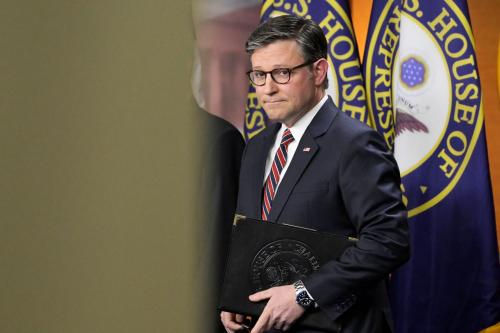As most Americans realize by now, after the election Congress and the president will face a so-called “fiscal cliff.” The cliff is a series of tax and spending provisions that will either expire or start right after January 1. All the provisions have the effect of decreasing the deficit by either increasing taxes or reducing spending. If Congress fails to prevent these provisions from being implemented, the simultaneous increase in tax rates and the reductions in government spending, which would total nearly $8 trillion over 10 years according to the Congressional Budget Office, will cause the nation to fall back into recession. To avoid this outcome, Congress can continue its past behavior and kick the can down the road by delaying implementation of the provisions.
Although no one planned for all these provisions to come into play at one time, there can be no doubt that Congress and the president have failed to deal with every element of the cliff until now. Moreover, anyone with a calendar should have known for a year now that these revenue and spending elements of the cliff were going to hit simultaneously shortly after New Year’s Eve. Further, there have been any number of opportunities in the last several years to extricate the nation from the geological fault that caused the cliff – the nation’s expanding debt.
When Congress reassembles for its lame-duck session on November 13, there are lots of good options that could actually turn the cliff into an occasion for serious and permanent progress on the debt. Here are four elements of a fine compromise, a version of which has been proposed by the Bipartisan Policy Center and that enjoys some support on Capitol Hill (in Las Vegas terms, the odds of this compromise passing during the lame duck session would be about 1 in 100,000 – add more zeros if you like).
First, the various elements of the fiscal cliff would be postponed for six months or so and the debt ceiling raised to avoid another fight over whether the nation is going to actually pay its bills. Second, following regular Congressional procedure, Congress would be given until June 1 to come up with a grand bargain that would result in deficit reduction of a set amount – perhaps $5 trillion over 10 years. The provisions from the Congressional committees involved would be folded into a single bill that Congress would have to consider in an up or down vote with no amendments. Third, the compromise would include an automatic backup plan with tax increases and spending cuts sufficient to produce an equivalent amount of deficit savings should Congress fail to meet its June 1 deadline. Finally, for those opposed to total can kicking, the compromise would include spending cuts over the next ten years of around half a trillion dollars that would become law upon enactment during the lame duck.
This plan is reasonable and potentially effective in making both a down payment on spending cuts in the sequester and simultaneously putting Congress in position to achieve a bipartisan grand compromise that includes tax reform and entitlement reform in the next six months. Of course, this wise and even clever compromise will in all likelihood enjoy the same fate as previously wise proposals like the recommendations of the Bowles-Simpson plan or the Domenici-Rivlin plan—death by Congressional and presidential can kicking.
Although Congress and the president get and deserve a lot of criticism for not taking effective action to reduce the debt and avoid a financial crisis that could cripple the nation’s economy for many years, the real problem is the American people. Polls show that Americans are more likely than in the past to say they want serious action on the deficit. But when asked whether they would support broad tax increases and cuts in Social Security or Medicare necessary to reduce the long-term deficit and continued accumulation of debt, they are opposed. The public knows that passing the bill to their children and grandchildren has worked so far. Why change now at the price of incurring a little discomfort?
Without the American people behind spending cuts and tax increases, the pusillanimous political class will continue applying their by now highly perfected routine of can kicking—never mind that every kick brings the nation closer to a financial disaster. The cardinal rule of American politics continues to be: above all, cause no pain.
The Brookings Institution is committed to quality, independence, and impact.
We are supported by a diverse array of funders. In line with our values and policies, each Brookings publication represents the sole views of its author(s).



Commentary
Op-edThe Fiscal Cliff: Predictable, Reprehensible, But Still Avoidable
November 6, 2012